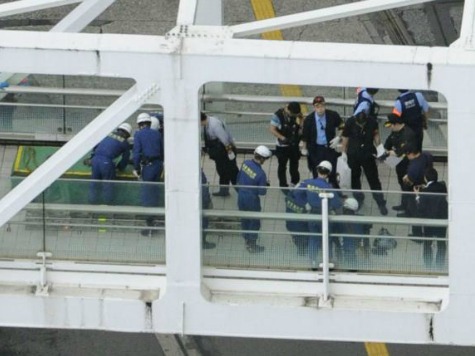Japan is expected to enact historic expansions to their constitutional ability to construct and keep an active military, a controversial topic for many in the region who recall with horror the crimes of the Japanese military in World War II. Among them, apparently: a man who chose to self-immolate in protest of the new proposals.
Reuters reports that the man, who has yet to be identified and has not been confirmed to have survived or perished in the act, spent much of the afternoon at the busy Shinjuku station in Tokyo with a megaphone, protesting what he called “collective self-defense.” He sat on a pedestrian bridge, according to witnesses. “He was sitting cross legged and was just talking, so I thought it would end without incident… but when I came back to the same place 30 minutes later, he was still there. Then all of a sudden his body was enveloped in fire,”said one witness, a student passing by the area.
The incident, Reuters notes, was confirmed by police but not elaborated upon in any way. The incident concluded, witnesses told the wire service, as police hosed the man to stop the fire and took him away from the area.
The expansion of Japanese military powers has been a topic of particular controversy for both Japanese citizens and those in neighboring countries. The proposal, backed by Prime Minister Shinzo Abe, would reinterpret the Japanese Constitution to allow Japan to use its military to attack if it does so in defense of an ally that is under attack. The Japanese military was not previously allowed to attack another country on foreign soil. Abe announced in a speech this week his satisfaction with the approval of the plan. “Peace is not something you expect to be given, but it’s something that we must achieve on our own,” he told his audience at a press conference from Tokyo.
Japan announced in December that it would increase its military spending by 2.6% in direct response to agitation by the Chinese military in disputed territory, particularly the uninhabited Senkaku Islands, where the Chinese government established an Air Defense Identification Zone (ADIZ). The ADIZ would require Japanese aircraft to identify itself to the Chinese military if it passed through the territory, something Japan adamantly objected to.
China has been among the most vocal opponents of the Japanese military expansion law. The Chinese government quickly expressed its disapproval with the plan. “We urge the Japanese side to earnestly respect legitimate security concerns of its Asian neighbors, deal with relevant issues with discretion, not to harm the national sovereignty and security interests of China and not to undermine regional peace and stability,” said Foreign Ministry spokesman Hong Lei today.

COMMENTS
Please let us know if you're having issues with commenting.